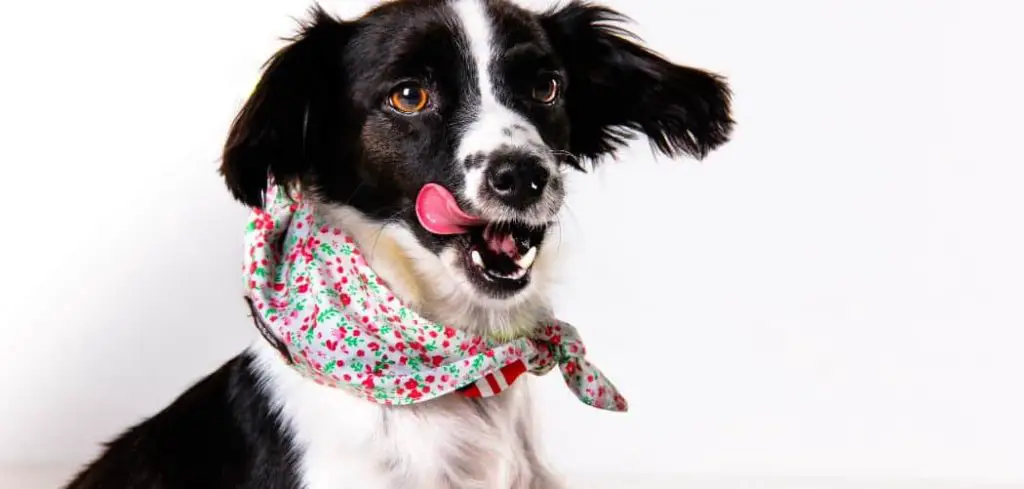If your dog is excessively licking its chops, it can be both puzzling and concerning. While the behavior may seem minor at first, constant lip or chop licking can signal an underlying health or behavioral issue that shouldn’t be ignored.
We outline the common causes of excessive chops licking in dogs, what you can do at home, and when to seek veterinary help.
Dog Chops
In dogs, the word “chops” usually refers to the loose, fleshy folds of skin around the mouth and lips.
It’s most commonly used to describe the jowls, especially in breeds with droopy or heavy lips, like Bloodhounds, Boxers, Mastiffs, and Bulldogs. When people say a dog is “licking its chops,” it means the dog is licking its lips and the skin around its mouth — often after eating, when anxious, or if something is irritating their mouth or stomach.

Dog Excessively Licking Chops — Why It Happens
A dog excessively licking their chops can result from nausea, dental disease, anxiety, or something as simple as food residue left on the mouth. Dogs often use their tongues to self-soothe, but when the behavior becomes repetitive, it may indicate pain, discomfort, or illness.
Some dogs may lick due to digestive upset, while others may do it in response to stress, oral irritation, or even seizures.
Identifying the reason behind this behavior is key to keeping your dog healthy.
Dog Excessively Licking Chops: Common Causes
Nausea and Digestive Upset
When dogs feel nauseous, they often lick their chops excessively as a response. This may happen before vomiting or when their stomach is unsettled. You might notice drooling, gulping, or grass eating alongside the licking.
Digestive upset can stem from dietary indiscretion, infections, or underlying gastrointestinal conditions like pancreatitis.
In this context, chop licking serves as a warning sign that your dog’s stomach is unsettled.
Read more: Dog Panting and Licking Lips Excessively (What it could mean)
Dental Disease and Oral Pain
Dental issues are one of the leading causes of dogs excessively licking their chops. Gum disease, tooth infections, or oral injuries can cause discomfort, leading a dog to lick repeatedly in an attempt to soothe the pain.
You may notice additional signs like bad breath, drooling, pawing at the mouth, or reluctance to eat hard food. Oral pain should never be ignored, as untreated dental problems can spread infection to other parts of the body.
Anxiety and Stress
Dogs may lick their chops when feeling anxious or stressed. This is a common displacement behavior—similar to nail-biting in humans. Situations like car rides, thunderstorms, or being left alone can trigger the behavior.
If licking occurs mainly in stressful scenarios, it may be behavioral rather than medical. However, ongoing stress can negatively impact health, so helping your dog feel secure is essential.
Seizures or Neurological Disorders
In some cases, excessive chop licking can signal a partial seizure or other neurological issue. Dogs experiencing these episodes may appear to lick air or their chops uncontrollably, sometimes accompanied by staring spells or unusual movements.
Because seizures are serious, it’s crucial to seek veterinary attention if this type of repetitive licking occurs, especially if paired with other unusual behaviors.
Allergies or Skin Irritation
Allergies—whether food-related or environmental—can cause discomfort around the face and mouth. Dogs may excessively lick their chops as a way to relieve itching or irritation.
Accompanying signs can include paw licking, ear infections, or red, inflamed skin. Allergies often require long-term management with the help of your veterinarian.
Foreign Object in the Mouth
Sometimes, something as simple as a stick, hair, or piece of food lodged in the mouth can cause excessive licking. Dogs will lick repeatedly to try and dislodge the irritant.
Checking your dog’s mouth carefully can sometimes reveal the problem. However, if the object is stuck or causing injury, professional removal may be necessary.
Read more: Dog licking lips excessively (What it really means)
What to Do If Your Dog Is Excessively Licking Its Chops
If your dog is frequently licking its chops, start by observing when and how often the behavior occurs. If it happens after meals, it may simply be a normal cleaning behavior.
But if it is frequent, persistent, or associated with other symptoms, you’ll need to take action.
At home, you can try adjusting feeding routines, ensuring your dog doesn’t have access to irritating or spoiled food, and keeping a stress-free environment.
Regular dental care—including brushing and vet cleanings—can prevent oral pain. For dogs prone to anxiety, calming techniques such as quiet spaces, gentle reassurance, or pheromone diffusers may help.
Always monitor for other signs like vomiting, drooling, or appetite loss, as these can point to more serious conditions. If licking seems unusual or relentless, veterinary evaluation is the safest step.
When to Call or Visit Your Vet
You should seek veterinary attention if your dog’s excessive chop licking is persistent or accompanied by other concerning symptoms. These include vomiting, diarrhea, drooling, loss of appetite, weight loss, facial swelling, or signs of pain.
A sudden increase in licking behavior without an obvious cause also warrants professional attention. Additionally, if licking seems to coincide with staring spells, tremors, or disorientation, a neurological issue may be at play and needs urgent care.
Because excessive licking can be both a behavioral habit and a symptom of serious medical conditions, erring on the side of caution ensures your dog gets the care it needs.
Read more: Old Dog Excessively Licking Lips (Why senior dogs do this)
Key Takeaway
Excessive licking of the chops can mean different things depending on the context—from minor behavioral habits to signs of illness. While some cases may resolve with simple home care, persistent licking is often a red flag that shouldn’t be overlooked.
By paying attention to your dog’s overall health, environment, and behavior, you can often identify the underlying cause. If in doubt, your veterinarian is the best partner to determine why your dog is excessively licking its chops and how to keep them comfortable and healthy.
